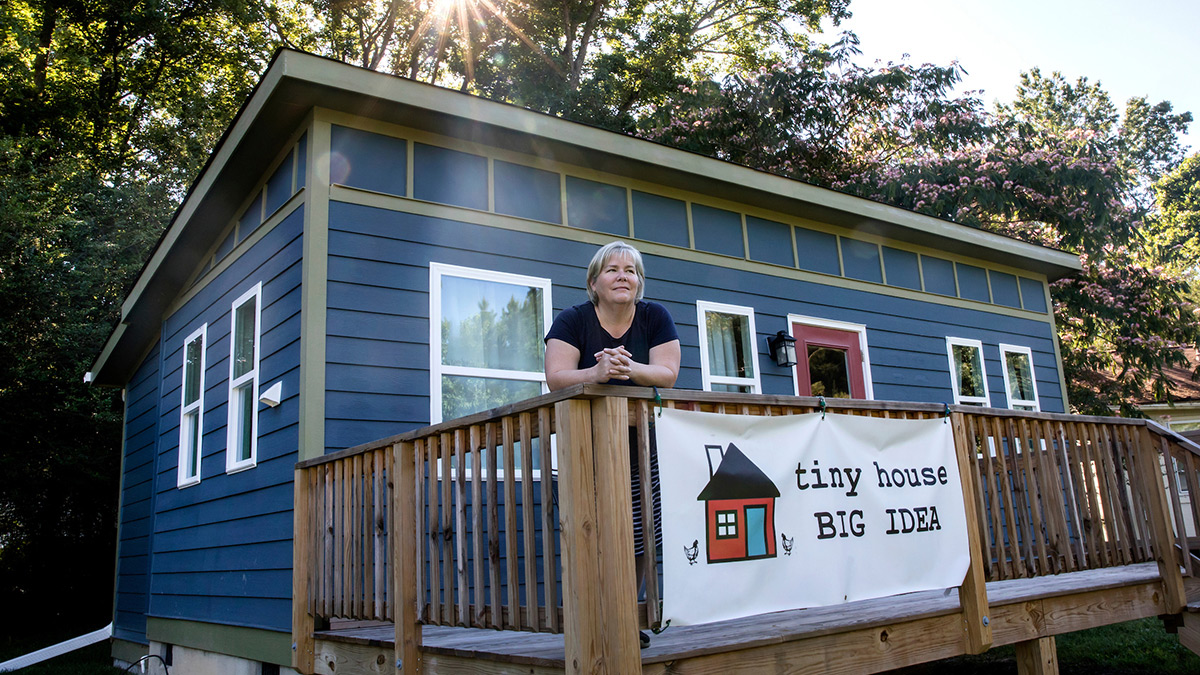School of Social Work nets $1 million grant for Tiny Homes Village
The Tiny Homes Village will offer innovative, affordable housing for people with mental illnesses and other health conditions.

The UNC School of Social Work has been awarded a $1 million, two-year grant from the international Oak Foundation to help fund the construction of the Tiny Homes Village, a demonstration project designed to create a new form of affordable housing for people with mental illnesses and other health conditions. The village will also support and house veterans in need.
A groundbreaking is scheduled for Nov. 15 at the village site in Chatham County. The project is being built through a public-private partnership led by local nonprofit Cross Disability Services Inc. and the School of Social Work. Cross Disability Services Inc.’s founder and CEO Thava Mahadevan is the founder and director of the Tiny Homes Village. Mahadevan has spent the last few years trying to get the innovative community off the ground, working closely with Amy Blank Wilson, co-director of the project and an associate professor and social work researcher at the School of Social Work.
Mahadevan and Wilson see the Tiny Homes Village, which includes the construction of fifteen 400-square-foot houses, as a model for building well-designed, permanent, sustainable homes for $50,000 each. The village will also feature community amenities, such as a clubhouse, walking trails, and an outdoor pavilion. The village will adjoin The Farm at Penny Lane, an alternative therapeutic farm in Chatham County that will provide residents with access to a community garden and healthy food, meaningful daily activities and physical and behavioral health services.
“Our goal is to build these homes in an environment that is designed to foster community participation and health and well-being,” said Wilson, grant project director.
The village may also provide a new option for increasing the state’s supply of affordable, sustainable housing, Mahadevan said. Such housing is critical for individuals with mental illness, who are among the most at risk for homelessness, he said. Residents who qualify to live in the Tiny Homes Village will pay, on average, $250 to $300 for rent, or about one-third of their monthly income.
“Safe and affordable housing supports are fundamental to the recovery of people impacted by mental illness,” Mahadevan said. “Fortunately, we are now one step closer to making it a reality with the support of Oak Foundation, the School of Social Work and other community partners.”
Residents are not expected to move in until the entire project is completed in 2021. As proposed, the tiny homes will consist of a bedroom, bathroom, kitchen and living room that are designed with a flexible floor plan, giving residents the ability to tailor these living spaces to meet their specific needs and preferences, Wilson said.
The $1 million Oak Foundation grant is the largest award Carolina and Cross Disability Services Inc. have received to support the overall project. In 2016, Wilson received a $75,000 C. Felix Harvey grant to fund initial research on the project. Two years later, Oak Foundation awarded the partners $50,000 to help finance the initial phase of construction, including planning and design. Money from the latest grant will be used to finance paving and other needed road improvements for Penny Lane, to clear and prepare the 4-acre site for vertical construction, including connection to sewer, and to construct three homes.
“This project is a model for how partners, including the University of North Carolina School of Social Work and community organizations, can work together to benefit our community,” said Oak Foundation program officer Millie Brobston.
In recent months, other private gifts — including more than $47,000 raised through the school’s April Giving Day Campaign — have been received to fund other parts of the project, including two more village homes. The School of Social Work and Cross Disability Services Inc. are working to raise the additional money needed to bring public water to the village and for the construction of the remaining houses, the clubhouse and the pavilion.
Financial support is the critical linchpin for moving the tiny homes project from conception to completion, Wilson said.
“The only way we’re getting to do what we’re doing is because people are investing in this idea and what it can mean for people with mental illness, for veterans and for people with other health conditions and for people living on fixed incomes with health needs,” she said. “So, we are beyond grateful to Oak Foundation and to our other donors. We are only where we are because people believe in this vision with us.”




